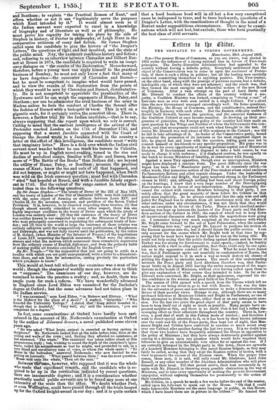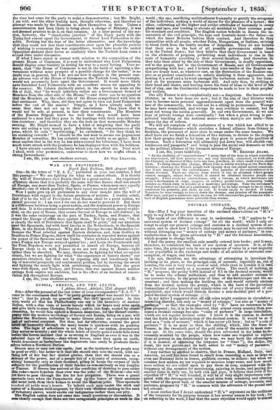Mtn to tbr thitur.
TUB OBSTACLE TO I STRONG GOVERNMENT.
Manchester, 28t4 August 1851i.
Stn—The present House of Commons, as you are aware, was elected in 1852 under the influence of a strong national bias in favour of Free-trade principle*. The Derby-Disraelite Administration had appealed to the country without having a definite policy. Everybody understood that the object of the Conservatives was to come in upon the sentiment of Protec- tion if there is such a thing in politics; but all the leading men carefully eschewed committing themselves to anything positive. The Free-traders, on the other hand, along with the prestige of previous success, had a definite, intelligible cry, of which they were not ashamed ; and the result was, that they, formed the moat energetic and influential section of the new House of Commons. After a vain attempt on the part of laird Derby and Mr. Disraeli to conduct the affairs of the country without a ma- jority, a Coalition Ministry was formed, comprising as "strong a cast " of first-rate men as ever were seen united in a single Cabinet. For a short time the new Government managed exceedingly well. On home questions, the Ministry, the House of Commons, and the constituencies, seemed tho- roughly in harmony with each other. But the Eastern.difliculty suddenly thrust itself forward, became the question, and the essential weakness of the Coalition Cabinet at once became manifest. In drawing up their pro- gramme of principles, the Foreign policy of the country had been made an. open question by the Whigs and Peelites of whom theGovernment was com- posed, and that arrangement could not work when brought to the teat. Of course Mr. Disraeli was well aware of this weakneas in the Cabinet ; nor did he fail to take advantage of it. As leader of the Conservative party, bound to consider the promotion of its interests as the most important object in life, he played fast and loose with the question, taking .good care not to commit himself or his friends to any speeifie proposition. His game was to lie in wait for every opportunity of making political capital Out of Ministerial blunders. If Government seemed disposed to take a bold course, he was ready to charge it with rashness if it displayed caution, he was equally on the watch to accuse Ministers of timidity, or connivance with Russia. Against a mere Tory opposition, though ever so unscrupulous, Ministers might have displayed a resolute front. The great difficulty since the war began has been the " Manchester party," as it is commonly called,—in other words, that numerous section of,the Free-traders whose creed embraces Parliamentary Reform and other organic changes. Under the leadership of Messieurs Cobden and Bright, that party mustered stronittlu the Parliament chosen in 1852; and, although nothing had been said a ut Foreign policy on the hustings, I know that a very large number of t 'e thoroughgoing Free-traders were in favour of non-intervention. Having frequently dis- cussed the subject with various Members belonging to that' party, I can
• safely affirm that the great majority of them follow Mr. Cobden- on that
• point Moat implicitly. As be always contended that the only wise and safe policy for England was to abstain from all interference with the affairs of other nations, under any circumstances, it was not Mid), that they would make an exception in favour of the Turks. Hence a most excellent under- standing was kept up between the leaders of the Peace party and the Aber- deen section of the Cabinet in 1853; the result of which was to keep down all inconvenient discussion about Russia while the negotiations were going on. I remember being very much surprised at the eagerness with which Mr:Bright came forward to the aid of Lord Palmerston, when the country was "drifting into war," and urged Mr. Layard to postpone his motion on the Eastern question sine die, lest it should injure the public service. lean only account for the course which Mr. Bright took at that time by sup- posing that he must have begun to feel that be was on the losing side. He Gould not help seeing that the public feeling against Russia and in favour of Turkey was too strong for Government to resist openly,—indeed, he frankly admitted, with a view to allay opposition, that there could only be one opin- ion as to the aggressive conduct of the Czar. What he must have feared was, that if Parliament spoke out manfully in condemnation of Russia, the nation might respond to it in such a way as would destroy all chance of settling the dispute by amicable means. The result of this understanding between the Peace party and Lord Aberdeen therefore was, that Parlia- ment broke hp in August 1863 leaving the entire management of the nego- tiations in the hands of Ministers, without ever having called upon them to give any explanation of what course they intended to take. So far as the Liberals were concerned, Mr. Bright, as their spokesman, expressed his en- tire confidence in the wisdom and good faith of the Premier. The session of 1854 opened with a speech from the Throne which left no doubt as to our being about to go to war with Russia. Now was the time for the advocates of peace and non-intervention to make a demonstration in favour of their peculiar views. Strange to say, although there are so many professed followers of Messieurs Cobden and Bright in Parliament, no one of them attempted to divide the House, either then or on any subsequent occa- sion. For the last two years the great object of that party seems to have been to keep itself out of sight as much as possible. Many people have ex- pressed surprise at this, and there is no doubt that it has bad a rather dis- couraging effect on their adherents throughout the country. There is, how- ever, a good deal of craft in this Fabian mode of warfare; and therefore I wish to direct special attention to it, as it has been by their known influence over the rank and file of the Peace party, thus kept out of sight, that Mes- sieurs Bright and Cobden have contrived to exercise so much secret sway over one Cabinet after another during the last two years. It is no doubt true that those two leaders have frequently addressed the House in opposition to the policy of Ministers ; but they have always dexterously guarded against coming to a division upon any question which would have required their. followers to give an unmistakeable vote either for or against the war. If I am correctly informed by the Bright party in this town, there are upwards of a hundred Members belonging to this secret Russian brigade, as they may fairly be called, seeing that they adopt the Russian system of tactics, with a view to promote the success of the Russian cause. When the proper time comes, these men, it is said, will rally round Mr. Gladstone Lord John Russell, or any other member of the Aberdeen Administration who will place himself at their head. Till that period arrive, their task necessarily is„ to unite with Mr. Disraeli in throwing every possible obstruction in the way of Ministers, and to take every opportunity of making the present Government unpopular, without exposing themselves too prominently to the notice of their constituents.
Mr. Cobden, in a speech he made a few weeks before the end of the session, called upon his followers to speak out in the House. "Oh that I could make honourable Members use the same language in public, in this House, which I have heard them use in private in the lobbies !" He fancied that
the time had come for the party to make a demonstration ; but Mr. Bright, I am told, and the other leading men, thought otherwise, and therefore no attempt was made by the Russians to show themselves in force. Unless a demonstration had been likely to bring about a change of Ministry, it-was not deemed prudent to do it on that occasion. At a later period of the ses- sion, however, the "clandestine junction" of the Peace party with the Tories had almost upset the Government, or forced Lord Palmerston to dis- solve. Nothing but the fear of the latter alternative, --and the knowledge that they could not face their constituents even upon the plausible pretext of wishing to economize the war expenditure would have made the united Opposition disband their forces -so suddenly vilien the Turkish Loan came a second time under discussion.
If what I have stated is correct with relation to the composition of the present House of Commons, it is easy to understand why Lord Palmerston should display some timidity in feeling his way to a surer footing. Your re- miSrk, that "the House of Commons is not in the habit of upsetting a Go- 'ferment without some prospect of a possible change for the better,' is no doubt true in general, but I do not see how it applies in the present case. An adverse vote of the House of Commons on the Turkish Loan, for example, would not necessarily have upset the Government. It would more likely havefurnished Lord Palmerston with an excellent reason for appealing to the country. Mr. Cobden distinctly stated, in the speech be made on the 8th of July, that "he would infinitely rather see a Government formed of Members from the other side of the House,"—and there can be no question that the Members on the other side of the House sympathized with him in that sentiment. Why, then, did they notagree to turn out Lord Palmerston before the end of the session ? Simply, as I have already said, be- eause they dare not act up to their convictions. They knew that it would not be safe, at present, to face their constituents. The Members of the RUSI3i8D Brigade knew too well that they would have been eashiered to a man had they gone to the hustings with their non-interven- tiondoetrines; and therefore they ate the leek on that memorable Monday evening. Mr. Bright seemed to have a kind of misgiving that the party were not acting a very manly part. Referring to the remonstrances of the press, which be calls brewbeating," he exclaimed, "Do they think we are sneaking cowards ? " I should be the last man to accuse our pugnacious Member of cowardice. Be has certainly come out boldly as an gator. But I must confess that in the -way he ha mmiceuvered his battalions, I have been much more struck with the prudence be has displayed than with his boldness.
I have already exceeded the limits which you can afford me. Next week I shall, with your permissien, endeavour to show how we might obtain a strong Government.
I am, Sir, your meet obedient servant, AN OLD LPAGUED..



























 Previous page
Previous page